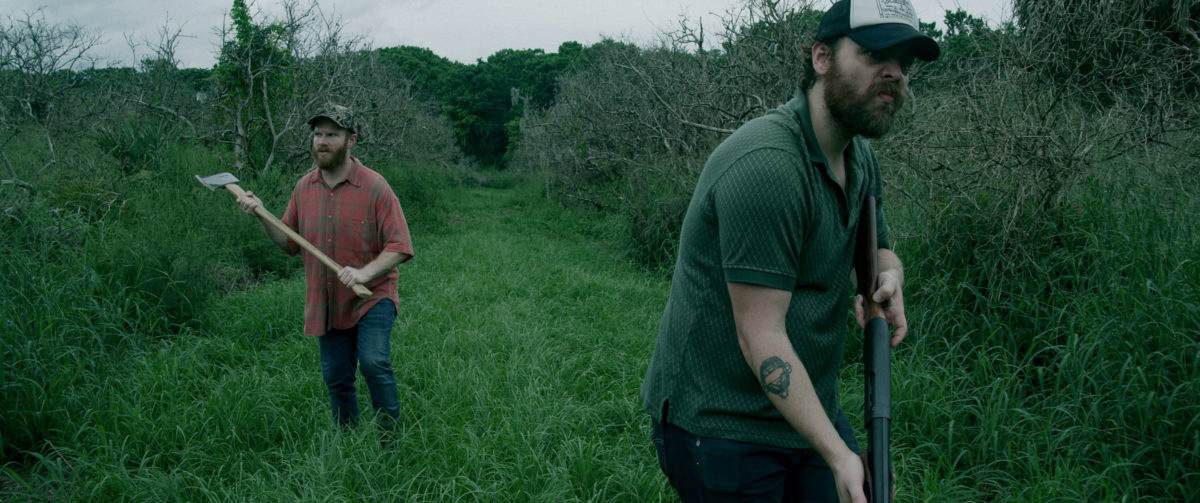Some of the best films at every year’s Tribeca feel distinctly like they don’t quite fit your typical fest fare. What I mean is there’s sort of a brand to a “Sundance Movie” or a “SXSW Movie,” and while “Tribeca Movie” isn’t really a thing, it’s always most interesting to see films from this festival that have their own distinct, hard-to-categorize flavor. Two of the best of this year’s Tribeca slate from the opening weekend have their own slightly left-of-center personalities. One takes the structure of a dissatisfied housewife drama and weds it to something altogether unexpected about trauma and the patriarchy while the other is that all-too-rare hybrid of relationship drama meets monster movie. Even the third movie in this dispatch, while disappointing, comes from the uncommon genre of post-apocalyptic gender commentary.
It’s easy to see why Justin Benson and Aaron Moorhead, the mega-talented writer/directors of “The Endless,” were attracted enough to “Something Else” to produce (and Benson even co-stars). Like their work it melds genre ideas with a commentary on the drama of human nature and its tricky relationships. Jeremy Gardner does fantastic work as actor/writer/co-director in a film that feels deeply personal and unlike anything else I’ve seen so far this year. It takes some crazy risks at around the 50-minute mark—including a lengthy, dialogue-heavy, static scene in which you realize the movie has never really been about a monster—and they don’t all pay off, but there’s a lot to like in this film’s ambitious and very distinct voice.
Gardner plays Hank, a likable bar owner in a small town who has been unable to really commit to his longtime girlfriend Abby (Brea Grant). “Something Else” flashes back and forth between the early, happy days of Hank & Abby and Hank’s present day, which is, well, not great. “Something Else” is a commentary on those awful days after a break-up of a long-term relationship in which people have a habit of drinking more than they shower—only with a monster movie attached to it. You see, every night, something crawls out of the woods and scratches up Hank’s door. He’s tried to shoot it, but he always misses, and no one in town believes him that there’s a literal monster stalking him when the sun goes down.
Of course, the monster could be read as regret, depression, or whatever emotion you want to attach to the end of a relationship, but Gardner is too smart to be too literal about that connection. Right after a tense nighttime scene, he has the nerve to pull down the throttle on the monster movie and turn up the volume on the relationship one, and then he includes a shout-out to Lisa Loeb that nearly needs to be seen to be believed. I’m not convinced all the parts of Gardner and co-director Christian Stella’s vision come together, but I admire the willingness to make a rom-monster-com in a way we haven’t really seen before.

There’s a similar ingenuity to Carlo Mirabella-Davis’ “Swallow,” a domestic thriller about a woman who takes an unexpected turn in her life just when all external signs point to domestic bliss. Haley Bennett is fearless as Hunter, one of those women who appears to have everything in life except for any sort of agency or anything to do. Her husband (Austin Stowell) is about to be made head of the family business, and is clearly very, very wealthy. Hunter is a beautiful woman with a handsome husband and a multi-million-dollar home … which she wanders around all day with nothing to do. It doesn’t help that her in-laws (Elizabeth Marvel & David Rasche) treat her like a piece of property. One day, Hunter is fascinated by a beautiful red marble. And then she swallows it.
Later that night, she tells her husband she did something unexpected that day, and I think that’s part of the unspoken desire that propels Hunter to keep swallowing increasingly dangerous objects (including a push pin)—a break from a numbing norm. Mirabella-Davis interjects another reason for Hunter’s behavior that I don’t particularly think works (even if it allows for an excellent one-scene performance by Denis O’Hare), but his eye is strong throughout and Bennett is completely committed to a very difficult role. As Hunter’s mental illness becomes more pronounced her family and husband become more controlling, which only leads her to want to lash out even more. There’s a commentary on agency and repression embedded in “Swallow” that feels a little underdeveloped, but it’s worth seeing for Mirabella-Davis’ strong compositions and use of color, along with Bennett’s great work.

Sadly, it’s harder to pick out elements of “Only” to recommend, beyond its interesting idea of a world in which man’s violence against women and control of their bodies becomes even more magnified than it is now. The concept is almost an inverse of the excellent graphic novel Y: The Last Man by Brian K. Vaughan, in which almost all the people on the planet with an XY chromosome were suddenly eradicated. In “Only,” it’s a comet that unleashes a disease that wipes out most of the women on Earth. Will (Leslie Odom, Jr.) rushes home and seals up their home, keeping his girlfriend Eva (Freida Pinto) safe from what’s outside. “Only” flashes back and forth between the harrowing early days after the outbreak and a trip much later when the couple decides to try and leave the safety of their apartment.
Takashi Doscher never finds the pulse of “Only”—the structure is a tragic mistake, not allowing either the panic of the early days or the melancholy of the later ones to register as they would if the story wasn’t constantly switching between the two—and so we never care about the fate of Eva and Will like we need to. Pinto and Odom don’t have the chemistry needed for the film to work either, but it’s more a problem of a script that doesn’t ground their relationship in anything more than another element of the plot. Also, for a film that really needs to be about how quickly men would turn women into property— survivors all over the planet are rounded up by both ravagers and the government, and neither sounds like a safe situation—“Only” is frustratingly underdeveloped as a thematic/conversation piece.












